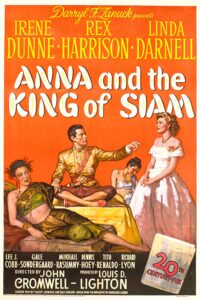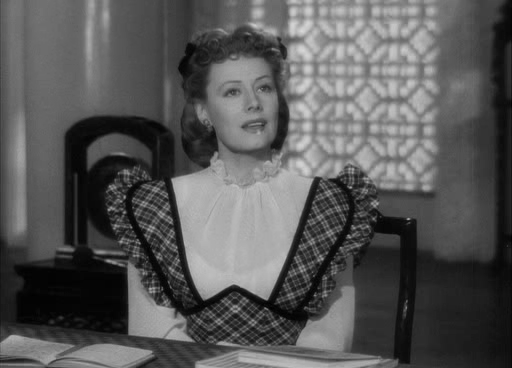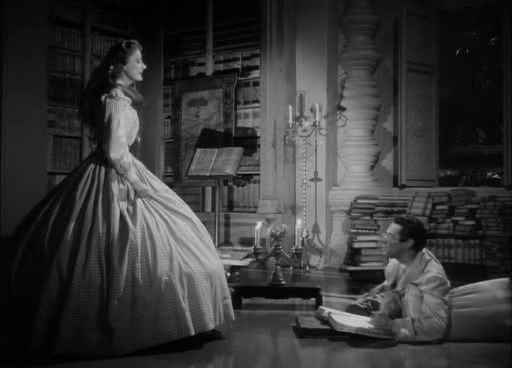“Women do not exist in Siam — they simply do not exist.”
|

Synopsis:
A widowed schoolteacher (Irene Dunne) arrives in Siam with her son (Richard Lyon) prepared to teach the many wives and children of King Mongkut (Rex Harrison) — including the son (Tito Renaldo) of Mongkut’s first wife (Gale Sondergaard). She’s quickly taught by Mongkut’s right-hand-man (Lee J. Cobb) about his many quirks and sexist beliefs, but pushes back when Mongkut refuses to give her the house he promised. When Anna witnesses Mongkut’s “number one wife” (Linda Darnell) being mistreated, she feels she’s had enough — but can she be convinced to stay?
|
|
Genres:
- Feminism and Women’s Issues
- Historical Drama
- Irene Dunne Films
- John Cromwell Films
- Lee J. Cobb Films
- Linda Darnell Films
- Rex Harrison Films
- Royalty and Nobility
- Teachers
Review:
This first cinematic adaptation (by director John Cromwell) of Margaret Langdon’s biographical novel about Anna Leonowens is a worthy predecessor to its more famous musical remake, The King and I (1956). Dunne matches Deborah Kerr in both intensity and believability as a bold widow who stands up to toxic patriarchy and corruption in a foreign country while remaining sympathetic to the conflicted goals of its intelligent but brutal leader. Refreshingly, there is no hint of romantic interest between Dunne and Harrison; their relationship is one of begrudging mutual respect (and, for Dunne, eventually deep commitment). Of note are both Arthur Miller’s cinematography and Bernard Herrmann’s score, adding to the quality of this slightly over-long but engaging feminist tale.
Redeeming Qualities and Moments:
- Irene Dunne as Anna (nominated as one of the Best Actresses of the Year in Peary’s Alternate Oscars)

- Rex Harrison as the King (nominated as one of the Best Actors of the Year in Alternate Oscars)

- Arthur C. Miller’s cinematography

- Bernard Herrmann’s score (check out the horror-flick ambience as Anna is leaving the king’s palace at night and hears a baby crying on her way home)
Must See?
No, but it’s certainly recommended for one-time viewing.
Links:
|
One thought on “Anna and the King of Siam (1946)”
A once-must, for its place in cinema history. As per my post in ‘The ’40s-’50s in Film’ (fb):
“Other countries won’t trust a nation where a man can put himself above the law.”
‘Anna and the King of Siam’ (1946): Does that quote above remind you of anyone… in particular? Funny (or, rather, not funny) how – while watching – the line jumped out at me… since the US now faces its own trust-plummet. Of course, The Thing is no king, though he’d dearly love to be. And, though he may share some of the pompous fool quality brought out in Rex Harrison’s performance, the similarity continues to fade as we watch the complexity Harrison brings to his role.
This is, of course, ‘The King and I’ without the songs. I’d only seen it once before but had forgotten how generally powerful it is… maybe even more so than the musical. I’ve never been a real fan of either Harrison or Irene Dunne but I must say they exhibit marvelous chemistry together. Watching them spar is very engaging. Along with John Cromwell’s sharp direction, the film benefits strongly from its Oscar-winning cinematography and art direction – as well as Bernard Herrmann’s uncharacteristically sensitive score. In the secondary roles, there’s fine support from Lee J. Cobb, Gale Sondergaard and Linda Darnell – though it’s creepy seeing Darnell die by fire (knowing that’s how she died in real life). Darnell’s Tuptim has a character arc that is tougher and edgier than Rita Moreno’s in the musical. But then… if this film differs considerably from Rodgers and Hammerstein, it also differs significantly from Margaret Landon’s novel… and apparently also veers off from Anna Leonowens’ original diaries. (Wikipedia illuminates to a degree.)
Who knows how much is actually true? Both this film and the movie musical faced condemnation in Thailand for being disrespectful, inaccurate and insulting. The King’s great-grandson eventually remarked, “[It’s] 90 percent exaggerated. My great-grandfather was really quite a mild and nice man.” One could quibble about some things: i.e., Caucasians playing Asians; a sweeping ethnocentric attitude that seems total, etc. Still, warts and all, this is an intriguing peek into a very specific culture clash.